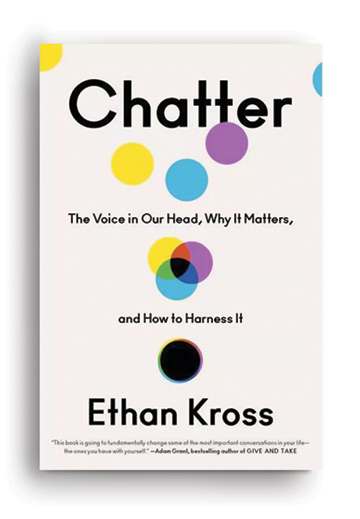
By Ethan Kross C’01
Crown, 2021, $28
How to make the most out of the voices in your head.
Were you to receive a handwritten note filled with “violent drawings” and “hateful slurs,” you might, quite naturally, freak out. But after the police had reassured you that public figures receive empty threats all the time, and this one, like most others, would likely blow over, you might start to feel better. And if, as time went on, nothing did happen, perhaps you’d eventually relax.
But what if, instead, your frantic thoughts started spiraling out of control. Should I get a gun? Should we move? How quickly can I find a new job? What if you stayed up late peering out the window, a baseball bat nearby, contemplating whether to do a Google search for a “bodyguard who specializes in protecting professors”? Well, then it might be time to give yourself a good talking to. In Chatter: The Voice in Our Head, Why It Matters, and How to Harness It (Crown, 2021), experimental psychologist and neuroscientist Ethan Kross C’01 describes his experience with this very situation a decade ago. He never did find out who sent him the letter, or why, and he never heard from its sender again. Still, its power to panic and provoke him brought home all that he had learned, and taught, about the ability of the mind to manipulate our emotions.
In the book, Kross delves into what our inner (or default) voice typically concerns itself with—observation, planning, rumination, daydreaming—as it churns in the background while we go about our daily lives. Then he looks at how things can go awry when “chatter” takes over. Finally, he offers a series of techniques based on experimental research, including his own.
As a toddler growing up in Brooklyn, Kross learned the value of introspection from his “Zen” father. At Penn, he was drawn to psychology. But he quickly learned that “going inside,” as his dad called it, “could be helpful for some people sometimes but not for others at other times,” he says. “There wasn’t a lot of understanding about why this was, and I decided I wanted to figure it out.” He went on to pursue a doctorate in psychology at Columbia and now teaches at the University of Michigan, where he founded and runs the Emotion & Self Control Lab.
Chatter is his first book. “Its goal,” he says, “is to put people in a position where they have more control over their inner voice.”
He likens that voice to a Swiss Army knife, which can tackle a wide variety of tasks. It can silently compile a mental list of the items we need from the grocery store or help us rehearse for a job interview. Sometimes it makes its presence felt more forcefully, like a coach or a critic.
It matters, then, which voice we’re hearing—or if we’re hearing any voice at all. Take the story of Jill Bolte Taylor, which Kross shares in the book. A fellow scientist who suffered a stroke, she later remembered her thoughts as suddenly “inconsistent, fragmented, and interrupted by intermittent silence.” She struggled with the question of whether she was still herself without “those little voices inside her head,” but also felt strangely liberated. “The growing void in my traumatized brain was entirely seductive,” she said. “I welcomed the reprieve that the silence brought from the constant chatter.” What we learn from her case, Kross contends, is that the small doses of anxiety or sadness chatter can bring are part of what makes us human. “The challenge isn’t to avoid negative states altogether,” he writes. “It’s to not let them consume you.”
Kross draws many examples from sports figures. In one passage, he compares the astounding meltdown of St. Louis Cardinals pitcher Rick Ankiel with the seemingly unthinking ease of gymnast Simone Biles’ history-making routines. In his Major League Baseball playoff debut in 2000, Ankiel threw five wild pitches and walked four batters in a single inning before being removed from the game. The highly touted pitcher continued to struggle with his control, causing him to switch positions to the outfield and later writing in his memoir about having “the yips” when he pitched. Biles, on the other hand, became the first woman to achieve a competitive triple-double flip, in part thanks to her brain’s ability to guide her automatically through the steps—though, she too, went on to suffer a similar fate as Ankiel at this summer’s Olympics, removing herself from part of the competition because of a mental block gymnasts know as “the twisties.”
As Kross points out elsewhere, social media can turn the public spotlight on virtually anyone. Not only does this cause us to worry endlessly about self-presentation, but it can also lead to a monsoon of oversharing, vaulting us into a feedback loop of empathy and venting that ultimately does more harm than good. “Social media allows us to connect with others in the immediate aftermath of a negative emotional response, before time provides us with the opportunity to rethink how we’re feeling or what we’re planning to do,” he writes.
Instead of dwelling and revisiting, Kross encourages readers to try distancing. If we picture ourselves five years from now, or even zoom out just a bit and look at the larger context, there’s a good chance that the doubts and insecurities that plague us will seem less significant. Self-talk—to the point of literally addressing yourself by your own name to snap out of the mind’s relentless echo chamber—is another tactic. “Ethan, what are you doing? This is crazy!” Kross recalls thinking as his fingers poised over the keyboard at 3 a.m., ready to Google bodyguard services because of that nasty letter. Suddenly he was able to calm himself and assess his predicament more logically. Referring to himself as “you” helped still more. “You have a state-of-the-art alarm system,” he thought. “Nothing else disconcerting has happened since you first received the letter. Ethan, go to bed.” Imagining that you are advising a friend is another chatter-busting strategy.
Other sections explore the chatter-fighting powers of temporarily moving into a different, awe-inspiring physical environment (natural or cultural); normalizing your situation (reminding yourself that the grief, or setback, or struggle that you’re experiencing isn’t unique to you); and leaning on mind games, such as a comforting ritual, that can bring a sense of order and control (think of a baseball player who might admit to wearing the same shirt under his uniform during every game to keep a hitting streak alive). Of course, like Kross himself, we can familiarize ourselves with these tricks and still succumb to chatter anyway. This is known as Solomon’s Paradox, after the biblical king known for dishing out good advice but not necessarily following it. Still, Kross believes that learning to understand and master the mind is a valuable practice that needs to be nurtured from an early age. To that end, he’s collaborating with University of Michigan psychology and neurology professor John Jonides Gr’75; University of Virginia psychology professor Daniel Willingham; and Angela Duckworth Gr’06, the Rosa Lee and Egbert Chang Professor of psychology and founder and CEO of Character Lab [“Character’s Content,” May|Jun 2012], to develop a middle school curriculum on the science of self-control.
Nearly 500 kids participated in a pilot program in 2017, learning about techniques such as journaling, distanced self-talk, and reframing. Many later said that they turned to these tools to a significant extent in their daily lives, Kross reports. “Reflecting on our lives is not inherently a good or bad thing,” he says. “It’s a human capacity that can help or harm us, depending on how we use and master it.”
—JoAnn Greco




